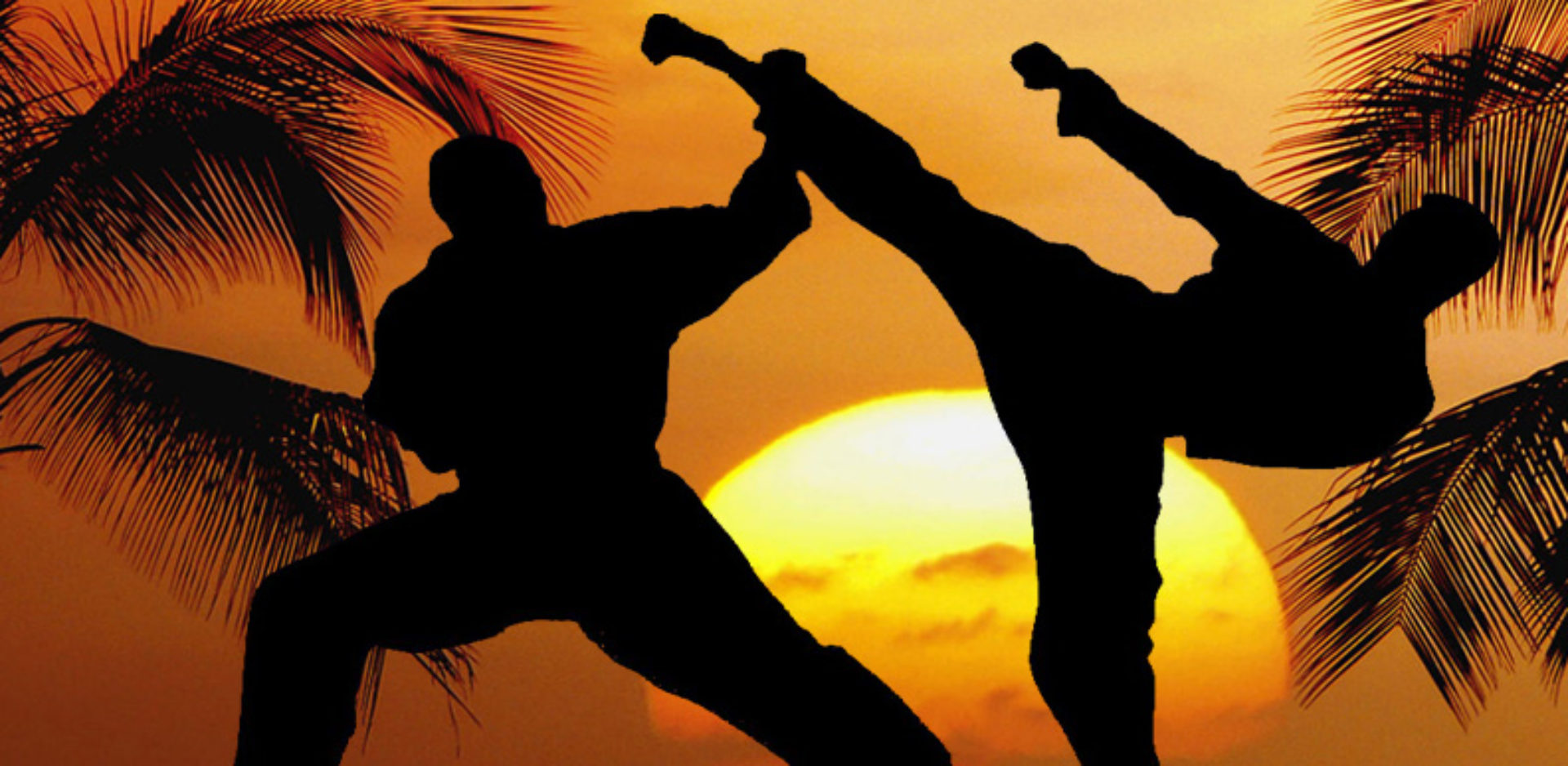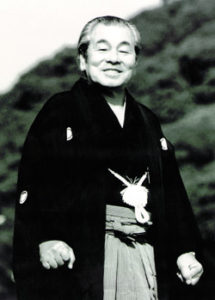 The late Soke Isamu Tamotsu founded the Shorinjiryu Karate-do Renshinkan. He was born at Amami in Kagoshima prefecture in 1919 and passed away in 2000 at age 80. In his childhood, Soke Isamu Tamotsu moved to Okinawa where he was introduced to Karate by fisherman who lived near his house. He visited Taiwan when he was seventeen years old, where he learned Kodokan-jujutsu from the late master Tadao Nakahara, and southern Chinese martial arts from the late master Chin. After the World War II, he came back to Okinawa, and learned Okinawa-Karate from Zenryo Shimabkuro who was the disciple of the late Chutoku Kyan.
The late Soke Isamu Tamotsu founded the Shorinjiryu Karate-do Renshinkan. He was born at Amami in Kagoshima prefecture in 1919 and passed away in 2000 at age 80. In his childhood, Soke Isamu Tamotsu moved to Okinawa where he was introduced to Karate by fisherman who lived near his house. He visited Taiwan when he was seventeen years old, where he learned Kodokan-jujutsu from the late master Tadao Nakahara, and southern Chinese martial arts from the late master Chin. After the World War II, he came back to Okinawa, and learned Okinawa-Karate from Zenryo Shimabkuro who was the disciple of the late Chutoku Kyan. 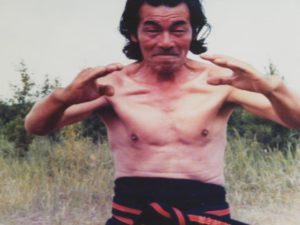 Chutoku was famous master of Okinawa Karate. Isamu mastered not only Karate-do but also Kodokan-jujutsu, Hoen-ryu Taijutsu, Kenso-ryu-jujutsu, Hakko-ryu-jujutsum, bo-jutsu (martial arts of using stick), Jo-jutsu (martial arts of using short staff), Sai-jutsu (martial arts of using a dagger-shaped truncheon), and so on. It took half of his life. He coordinated these martial arts and produce new techniques with quite strict practice. In 1955, he founded Shorinjiryu Karate-do Renshinkan at Kagoshima in a small Dojo. He founded All Japan Shorinjiryu Karate-do Federation, Kagoshima Karate-do Federation and West Japan Karate-do Federation and assumed chairperson of the federations.
Chutoku was famous master of Okinawa Karate. Isamu mastered not only Karate-do but also Kodokan-jujutsu, Hoen-ryu Taijutsu, Kenso-ryu-jujutsu, Hakko-ryu-jujutsum, bo-jutsu (martial arts of using stick), Jo-jutsu (martial arts of using short staff), Sai-jutsu (martial arts of using a dagger-shaped truncheon), and so on. It took half of his life. He coordinated these martial arts and produce new techniques with quite strict practice. In 1955, he founded Shorinjiryu Karate-do Renshinkan at Kagoshima in a small Dojo. He founded All Japan Shorinjiryu Karate-do Federation, Kagoshima Karate-do Federation and West Japan Karate-do Federation and assumed chairperson of the federations.
In 1964, at Hioki in Kagoshima, he opened Kenshi-ga-oka (headquarter of Renshinkan) and built a monument called Kenshi-no-to. His son, Soke Iwao Tamotsu, is the current head of Shorinjiryu Karate-do Renshinkan.
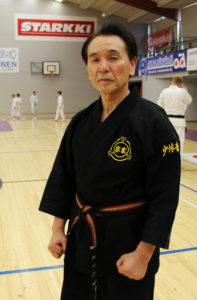 Soke Iwao Tamotsu, 10th Dan Master, was born in Kagoshima in 1948 as eldest son of the late Isamu Tamotsu. He became Soke of Shorinjiryu Karate-do Renshinkan in June 2000. After years of training and tutelage by his master and father, Iwao Tamotsu mastered the ultimate techniques of Kata and Kumite. His special Embu of Kushanku-no-Kata is considered the highest summit of Shorinjiryu Seiryu Shichiho (Shorinjiryu Genuine Seven Methods). In 1967, Iwao Tamotsu won the 1st All Japan Shorinjiryu Karate-do Championship, and then began missionary activities. In 1969, at the age of 19, he traveled to the Philippines to coach at the University of Baguio. He also coached in Taipei as the head of the delegation to Taiwan in 1971, as well as coaching in the Dominican Republic and other Central American countries in 1981. In recent years, Soke Iwao Tamotsu has been promoting the internationalization of Karate-do by teaching this profoundly spiritual Japanese Budo in Europe, India, and North America.
Soke Iwao Tamotsu, 10th Dan Master, was born in Kagoshima in 1948 as eldest son of the late Isamu Tamotsu. He became Soke of Shorinjiryu Karate-do Renshinkan in June 2000. After years of training and tutelage by his master and father, Iwao Tamotsu mastered the ultimate techniques of Kata and Kumite. His special Embu of Kushanku-no-Kata is considered the highest summit of Shorinjiryu Seiryu Shichiho (Shorinjiryu Genuine Seven Methods). In 1967, Iwao Tamotsu won the 1st All Japan Shorinjiryu Karate-do Championship, and then began missionary activities. In 1969, at the age of 19, he traveled to the Philippines to coach at the University of Baguio. He also coached in Taipei as the head of the delegation to Taiwan in 1971, as well as coaching in the Dominican Republic and other Central American countries in 1981. In recent years, Soke Iwao Tamotsu has been promoting the internationalization of Karate-do by teaching this profoundly spiritual Japanese Budo in Europe, India, and North America. 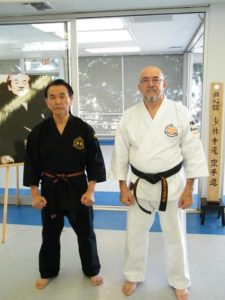 The number of international devotees has increased year by year. The Iwao Tamotsu Foundation International in India has been supporting the education of underprivileged children, as well as actively promoting international exchanges and welfare activities.
The number of international devotees has increased year by year. The Iwao Tamotsu Foundation International in India has been supporting the education of underprivileged children, as well as actively promoting international exchanges and welfare activities.

